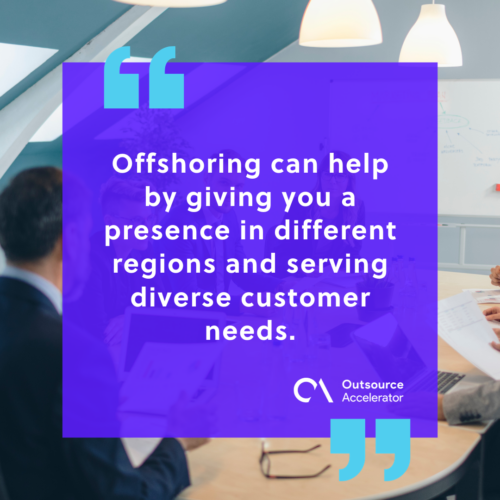5 examples of offshoring companies

Offshoring has significantly altered how businesses operate worldwide. It has become a strategic move for many companies seeking growth, efficiency, and innovation.
This article will explore the core concept of offshoring, investigate why companies choose this approach, and introduce five successful examples of offshoring companies.
What is offshoring?
Offshoring is a business strategy that involves relocating certain operations or functions of a company to another country.
Examples of offshoring services global businesses commonly acquire include manufacturing, customer support, and software development.

Why do companies offshore?
Companies opt for offshoring for several reasons:
Cost efficiency
Offshoring offers companies the advantage of accessing skilled labor at lower costs in different regions, enabling significant savings in operational expenses.
Businesses can maintain competitiveness while managing expenses effectively by relocating certain functions to countries with lower wage structures.
Market expansion
Companies choose to offshore to diversify their market presence, reaching untapped consumer bases across the globe.
This strategy allows them to adapt products and services to diverse cultures and preferences, fostering growth opportunities in new territories and expanding their customer reach.
Tax benefits
Offshoring to countries with favorable tax regulations enables companies to optimize their financial structures. It benefits them from reduced tax liabilities and incentives offered by foreign jurisdictions.
This strategic move helps in improving overall profitability and financial efficiency.
Risk diversification
Offshoring operations across different geographical locations helps companies mitigate risks associated with local economic fluctuations, political instability, or natural disasters.
By spreading their operations, companies ensure continuity even if one region faces challenges, safeguarding their business interests.

5 successful examples of offshoring companies
Here is a list of five successful examples of companies that offshored services:
1. WhatsApp
WhatsApp is a messaging and voice-over-IP (VoIP) app that originated in the United States.
During its inception, the creators of WhatsApp initially outsourced its development to Russian developers to keep costs down.
As the company expanded, some Russian developers relocated to the United States. Following its significant growth and success, Facebook bought the company for $16 billion.
2. Google
Google is an American multinational technology firm that delivers internet-based services such as a search engine, cloud computing, and similar offerings. It also engaged remote workers globally for software development tasks.
A Bloomberg report highlighted that in 2018, the total count of Google’s contracted workers surpassed that of their in-house employees.
3. Amazon
Amazon.com, Inc. is an American multinational technology corporation specializing in e-commerce, digital streaming, and artificial intelligence (AI).
The company chose to utilize call center services in South Africa, leveraging the skilled customer service providers in the country.
In 2018, Amazon expanded its customer service outsourcing operations by establishing a base in Cebu, Philippines.
In addition to customer support, Amazon has moved its Research and Development (R&D) to a Ukrainian startup that focuses on creating home security systems.
This strategic decision enables Amazon to tap into high-quality talent while managing labor costs effectively.
4. Samsung
Samsung Electronics Co., Ltd. is a multinational corporation in South Korea known for producing electronic devices and smart appliances.
To meet the demand in key markets, Samsung has relocated its manufacturing operations, including investing $500 million in its semiconductor plant in Austin, Texas, back in 2005.
Samsung established a dedicated smartphone manufacturing plant in India to expand its global presence.
Moreover, the company has outsourced customer support services for Australian Samsung mobile users to the Philippines.
5. JPMorgan Chase
JPMorgan Chase has expanded its presence in the Philippines, specifically in Metro Manila, and a dedicated site in Cebu City.
The company has employed locals for software development, operations, mortgage services, and customer care for their US-based businesses.
JPMorgan Chase isn’t alone in this practice among financial institutions. Around 80% of the world’s major banks have shifted their software development operations offshore.
This strategic move allows these institutions to trim costs and bolster profits while maintaining service quality.
Furthermore, offshoring solutions enhance quality control measures and expedite production timelines.
When to start offshoring
When considering the opportunity to initiate offshoring, several pivotal aspects need to be considered, such as:
- Business growth – Check if your company is growing and needs to expand. Offshoring can help by getting access to different talents and cost-effective resources.
- Cost analysis – Analyze costs and benefits. See if offshoring fits your budget and long-term financial goals. Compare potential savings with setup and ongoing costs.
- Resource utilization – Check if your team is overwhelmed with non-essential tasks. Offshoring to premier companies like Offshore MVP can free up resources for core tasks and strategic goals.
- Market and global expansion – Think about entering new markets. Offshoring can help by giving you a presence in different regions and serving diverse customer needs.
- Technology and infrastructure – Make sure you have the needed technology for offshoring. Ensure seamless collaboration across borders and time zones.
- Risk mitigation – Plan for potential challenges like cultural differences and regulatory compliance. Prepare strategies to minimize risks.
- Timing and implementation – Choose the right time to start offshoring. Plan properly, align stakeholders, and implement it in phases to avoid disrupting current operations.

Companies that move operations overseas are reshaping how business works today, providing incredible opportunities for expansion, streamlined processes, and a worldwide presence.
Getting a handle on the details and drawing lessons from successful cases can give businesses the tools to make the most of this approach.







 Independent
Independent




